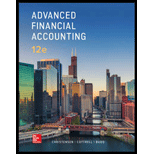
Advanced Financial Accounting
12th Edition
ISBN: 9781259916977
Author: Christensen, Theodore E., COTTRELL, David M., Budd, Cassy
Publisher: Mcgraw-hill Education,
expand_more
expand_more
format_list_bulleted
Question
Chapter 1, Problem 1.2.1E
To determine
It is an intangible asset that arises when a company acquires the business of an existing company. Goodwill is the excess amount of price paid for such acquisition over the total fair value of net assets.
To choose:The correct option out of four given options.
Expert Solution & Answer
Want to see the full answer?
Check out a sample textbook solution
Students have asked these similar questions
I need help solving this general accounting question with the proper methodology.
Calculate the gross profit percentage
Valdez Company's cost of goods sold is $480,000 variable and $510,000 fixed. The company's selling and administrative expenses are $320,000 variable and $540,000 fixed. If the company's sales is $1,750,000, what is its net income/loss? A) (325,000) B) 550,000 C) (450,000) D) ($100,000) HELP
Chapter 1 Solutions
Advanced Financial Accounting
Ch. 1 - What types of circumstances would encourage...Ch. 1 - How would the decision to dispose of a segment of...Ch. 1 - Prob. 1.3QCh. 1 - Prob. 1.4QCh. 1 - Prob. 1.5QCh. 1 - Prob. 1.6QCh. 1 - Prob. 1.7QCh. 1 - Prob. 1.8QCh. 1 - Prob. 1.9QCh. 1 - Prob. 1.10Q
Ch. 1 - Prob. 1.11QCh. 1 - Prob. 1.12QCh. 1 - Prob. 1.13QCh. 1 - Prob. 1.14QCh. 1 - Within the measurement period following a business...Ch. 1 - Prob. 1.16QCh. 1 - Prob. 1.1CCh. 1 - Prob. 1.2CCh. 1 - Prob. 1.3CCh. 1 - Prob. 1.4CCh. 1 - Risks Associated with Acquisitions Not all...Ch. 1 - Prob. 1.6CCh. 1 - Prob. 1.1.1ECh. 1 - Prob. 1.1.2ECh. 1 - Prob. 1.1.3ECh. 1 - Multiple-Choice Questions on Complex Organizations...Ch. 1 - Prob. 1.1.5ECh. 1 - Prob. 1.2.1ECh. 1 - Prob. 1.2.2ECh. 1 - Multiple-Choice Questions on Recording Business...Ch. 1 - Prob. 1.2.4ECh. 1 - Multiple-Choice Questions on Recording Business...Ch. 1 - Multiple-Choice Questions on Reported Balances...Ch. 1 - Multiple-Choice Questions on Reported Balances...Ch. 1 - Prob. 1.3.3ECh. 1 - Prob. 1.3.4ECh. 1 - Prob. 1.4.1ECh. 1 - Prob. 1.4.2ECh. 1 - Prob. 1.4.3ECh. 1 - Multiple-Choice Questions Involving Account...Ch. 1 - Prob. 1.4.5ECh. 1 - Prob. 1.5ECh. 1 - Prob. 1.6ECh. 1 - Prob. 1.7ECh. 1 - Prob. 1.8ECh. 1 - Prob. 1.9ECh. 1 - Prob. 1.10ECh. 1 - Balances Reported Following Combination Palm...Ch. 1 - Goodwill Recognition Spur Corporation reported the...Ch. 1 - Acquisition Using Debentures Planter Corporation...Ch. 1 - Bargain Purchase Using the data resented in E1-13,...Ch. 1 - Prob. 1.15ECh. 1 - Prob. 1.16ECh. 1 - Prob. 1.17ECh. 1 - Prob. 1.18ECh. 1 - Prob. 1.19ECh. 1 - Prob. 1.20ECh. 1 - Prob. 1.21ECh. 1 - Prob. 1.22ECh. 1 - Prob. 1.23ECh. 1 - Prob. 1.24PCh. 1 - Prob. 1.25PCh. 1 - Prob. 1.26PCh. 1 - Acquisition in Multiple Steps Peal Corporation...Ch. 1 - Prob. 1.28PCh. 1 - Prob. 1.29PCh. 1 - Prob. 1.30PCh. 1 - Prob. 1.31PCh. 1 - Computation of Account Balances Saspro Division is...Ch. 1 - Prob. 1.33PCh. 1 - Prob. 1.34PCh. 1 - Prob. 1.35PCh. 1 - Business Combination Following are the balance...Ch. 1 - Prob. 1.37PCh. 1 - Prob. 1.38PCh. 1 - Prob. 1.39PCh. 1 - Prob. 1.40P
Knowledge Booster
Similar questions
- Need helparrow_forwardTutor, need your helparrow_forwardSheinberg Industries reported 2023 sales ($ in millions) of $6,842 and a cost of goods sold of $5,120. The company uses the LIFO method for inventory valuation. It discloses that if the FIFO inventory valuation method had been used, inventories would have been $89.6 million and $73.2 million higher in 2023 and 2022, respectively. If Sheinberg used the FIFO method exclusively, it would have reported 2023 gross profit closest to? a. $1,110.5 million b. $1,319.1 million c. $1,738.4 millionarrow_forward
arrow_back_ios
SEE MORE QUESTIONS
arrow_forward_ios
Recommended textbooks for you
- Principles of Accounting Volume 1AccountingISBN:9781947172685Author:OpenStaxPublisher:OpenStax College

Principles of Accounting Volume 1
Accounting
ISBN:9781947172685
Author:OpenStax
Publisher:OpenStax College